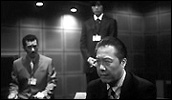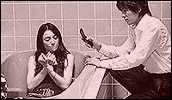g@me
- Year
- 2003
- Original title
- g@me
- Japanese title
- g@me
- Director
- Cast
- Running time
- 115 minutes
- Published
- 16 February 2004



by Andrew Cunningham
The cryptic but exciting previews for g@me make it look like a high tech, polished heist film. The centerpiece of the trailer has rising star Yukie Nakama in a silver-blue silk evening gown being lovingly shoved off a roof by first billed Naoto Fujiki, the camera panning down to reveal a rope tumbling after her, the other end attached to Fujiki's feet.
None of which has anything to do with the actual movie at all. A fittingly deceptive advertising campaign for a movie so preoccupied with double crosses it actually pretends to be a mediocre potboiler for the better part of an hour.
Based on the novel Geimu no Na wa Yuukai ("The name of the game is kidnapping") by popular mystery novelist Keigo Higashino I had expected a story more complex than the simple fake kidnapping g@me appears to be. Burned by his boss at work, irate Fujiki pays a late night visit to the man's home. He chickens out at the gates, but spies the boss' daughter Nakama sneaking over the wall. He follows her and gives her a place to stay, and they soon decided to fake her kidnapping and split the money.
While I've not read the original novel, I have read two collections of Higashino's short stories, which are devious, biting satires that present a gripping story while tearing the guts out of modern culture. Sadly, only a few hints of that edgy dark humor really surface here, mostly in a half-hearted analogy between business success and a criminal scheme that mainly seems to be a distraction from the plot.
The fake kidnapping that starts the story rolling proves to be merely the first of several layers, which are peeled away with evident relish by director Isaka. He seems much less comfortable with dialogue driven scenes, which have all the enthusiasm and pep of daytime television.
While Fujiki, the film's most obvious flaw, is a handsome, wooden bore, the female lead, Yukie Nakama, is well on her way to becoming one of the most famous women in Japan, with good reason. Her starring role in the cult hit Trick (which has continued for three TV season and a movie, unusual in a nation where most shows run for a scant baker's dozen episodes) established her as a beautiful, arrogant, and completely insane box office draw. She's got a commercial in seemingly every commercial break. Yet she seems badly miscast as a pouty, scheming, spoiled brat. Her manipulative games seem less endearing than aggravating, and her clothes seem to young for her. When she suddenly drops the act, swings around, and asks Fujiki if he'll kidnap her, if feels like a relief. When her character is in control of the titular game, she carries the movie with a brassy confidence that's impossible not to like. She does an excellent job selling the confusion when the rug has been pulled out from under her as well, and she ultimately makes the movie worth watching.
In the end, though, all the deception rings hollow. While there's certainly fun to be had watching g@me, it comes from imagining the movie that might have been. g@me ultimately doesn't play it well enough.